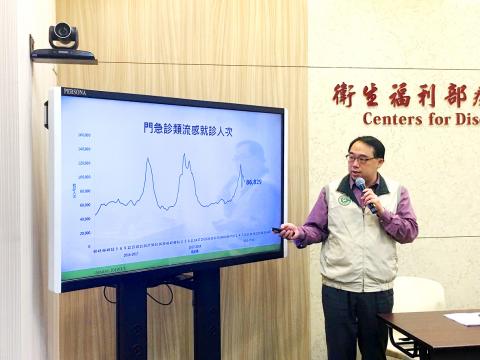Eight people died of the flu last week, while the peak influenza season in Taiwan could be over by the end of this month, the Centers for Disease Control (CDC) said yesterday.
Nationwide, 86,829 flu-like illnesses were reported, 5 percent less than the week before, Epidemic Intelligence Center Deputy Director Kuo Hung-wei (郭宏偉) said.
There were 44 cases of flu-related serious complications, mainly from type A influenza virus, 25 cases of influenza A (H1N1) virus, with 27 cases involving people 65 or older and 12 cases where the patients were aged 50 to 64, he said.

Photo: Lin Hui-chin, Taipei Times
In the cases of death, the patients were aged 50 to 85, seven of whom had chronic diseases and six who had not been vaccinated for this year’s flu season, CDC physician Lin Yung-ching (林詠青) said.
In all eight cases, the patient’s illness followed a similar course, beginning with common flu symptoms such as a fever, coughing and muscle pain, and later developing into difficulty breathing, shortness of breath and pneumonia, with an average of 10 days after the onset of symptoms, Lin said.
While many people think elderly people and children are more susceptible to the flu, five of those who died last week were aged 50 to 64, CDC Deputy Director-General Philip Lo (羅一鈞) said.
While this age group has been included in the government-funded flu vaccination program since 2016, the vaccination rate for this age group this flu season was only 17.9 percent, Lo said.
Diabetics and people with cardiovascular disease or chronic kidney disease have a higher risk of developing serious complications from the flu, such as pneumonia, heart attacks, irregular heartbeat or kidney failure, so the CDC advises them to protect themselves by getting vaccinated, he said.
While the peak period for the main H1N1 flu virus might end later this month, infections from the influenza A (H3N2) virus and type B viruses are increasing, so the period could be extended if they become the dominant strain, he added.
People should maintain good hand hygiene and cough etiquette, especially in crowed places or indoor spaces with airconditioning, and seek immediate treatment if they develop difficulty breathing, cyanosis, changes in consciousness or other serious problems, the CDC said.

Taiwanese can file complaints with the Tourism Administration to report travel agencies if their activities caused termination of a person’s citizenship, Mainland Affairs Council Minister Chiu Chui-cheng (邱垂正) said yesterday, after a podcaster highlighted a case in which a person’s citizenship was canceled for receiving a single-use Chinese passport to enter Russia. The council is aware of incidents in which people who signed up through Chinese travel agencies for tours of Russia were told they could obtain Russian visas and fast-track border clearance, Chiu told reporters on the sidelines of an event in Taipei. However, the travel agencies actually applied

Japanese footwear brand Onitsuka Tiger today issued a public apology and said it has suspended an employee amid allegations that the staff member discriminated against a Vietnamese customer at its Taipei 101 store. Posting on the social media platform Threads yesterday, a user said that an employee at the store said that “those shoes are very expensive” when her friend, who is a migrant worker from Vietnam, asked for assistance. The employee then ignored her until she asked again, to which she replied: "We don't have a size 37." The post had amassed nearly 26,000 likes and 916 comments as of this

New measures aimed at making Taiwan more attractive to foreign professionals came into effect this month, the National Development Council said yesterday. Among the changes, international students at Taiwanese universities would be able to work in Taiwan without a work permit in the two years after they graduate, explainer materials provided by the council said. In addition, foreign nationals who graduated from one of the world’s top 200 universities within the past five years can also apply for a two-year open work permit. Previously, those graduates would have needed to apply for a work permit using point-based criteria or have a Taiwanese company

The Shilin District Prosecutors’ Office yesterday indicted two Taiwanese and issued a wanted notice for Pete Liu (劉作虎), founder of Shenzhen-based smartphone manufacturer OnePlus Technology Co (萬普拉斯科技), for allegedly contravening the Act Governing Relations Between the People of the Taiwan Area and the Mainland Area (臺灣地區與大陸地區人民關係條例) by poaching 70 engineers in Taiwan. Liu allegedly traveled to Taiwan at the end of 2014 and met with a Taiwanese man surnamed Lin (林) to discuss establishing a mobile software research and development (R&D) team in Taiwan, prosecutors said. Without approval from the government, Lin, following Liu’s instructions, recruited more than 70 software